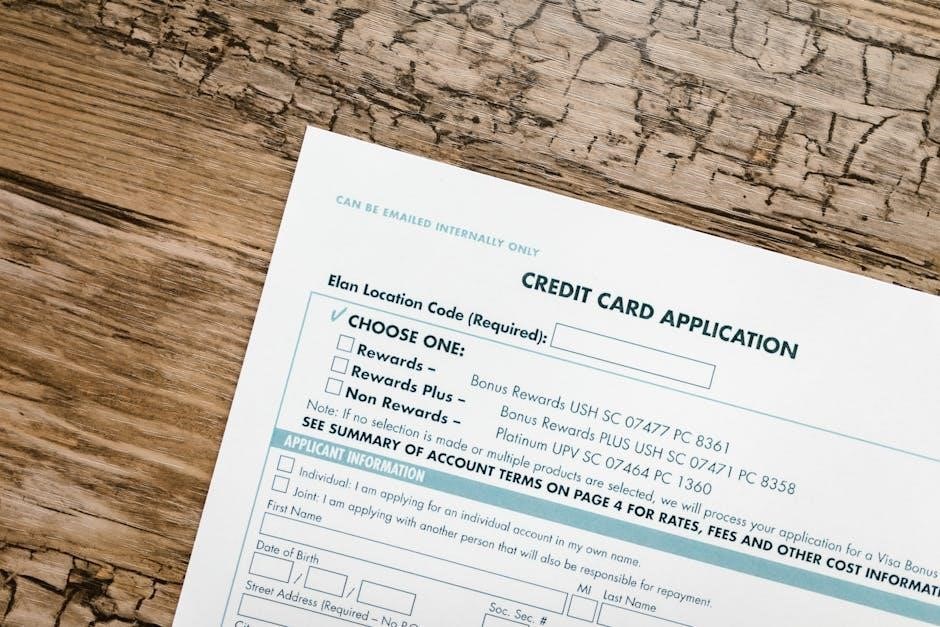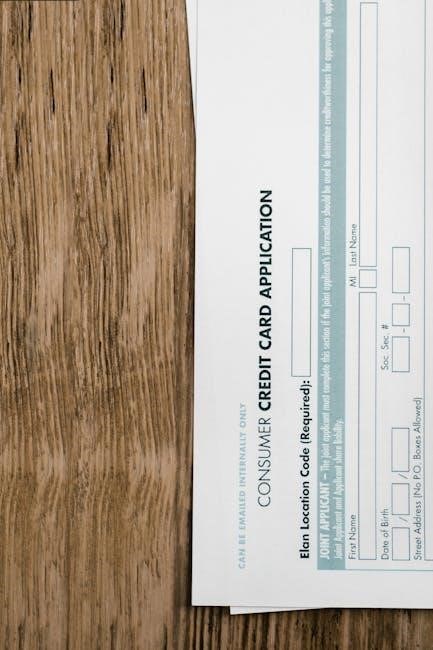The Texas Rental Application Form is a standardized document used by landlords to collect essential information from potential tenants. It streamlines the rental process, ensuring compliance with Texas laws and fair housing practices while providing a clear framework for tenant screening and evaluation.
Overview of the Texas Rental Application Process
The Texas rental application process begins with potential tenants submitting a completed application form, which includes personal, employment, and rental history details. Landlords review the information to assess suitability, often conducting credit checks and background screenings. An application fee may be required to cover these costs. The process ensures compliance with Texas rental laws and fair housing regulations. Landlords evaluate applications based on criteria like income stability, rental history, and creditworthiness. Once approved, tenants proceed to sign a lease agreement. This streamlined process helps landlords make informed decisions while protecting tenant rights, ensuring a fair and efficient rental experience for all parties involved.
Importance of Using a Standardized Rental Application Form
Using a standardized rental application form ensures consistency and fairness in the tenant screening process. It helps landlords gather essential information, such as personal details, rental history, and employment verification, in a structured manner. This reduces the risk of missing critical data and ensures compliance with legal requirements. A standardized form also protects landlords from potential discrimination claims by maintaining a uniform evaluation process for all applicants. Additionally, it streamlines the application review process, saving time and effort for both landlords and tenants. By using a standardized form, landlords can make informed decisions while ensuring fairness and transparency throughout the rental process.

Key Sections of the Texas Rental Application Form
The form typically includes sections for personal information, rental history, employment details, credit check authorization, and criminal background disclosure, ensuring a comprehensive and fair evaluation process.
Personal Information Required
The Texas Rental Application Form requires applicants to provide detailed personal information, including their full name, date of birth, Social Security number, and current address. Additionally, applicants must disclose their employment status, contact information, and emergency contacts. This section also asks for a list of current occupants and any pets. The information is used to verify identity, assess financial stability, and ensure compatibility with the rental property. Accurate and complete details are crucial for a smooth evaluation process, as incomplete information may delay or hinder the approval of the application.
Rental History and References
The Texas Rental Application Form requires applicants to provide a detailed rental history, including names and contact information of previous landlords, addresses of prior residences, and the duration of tenancy. Applicants may also be asked to list professional references or provide letters of recommendation. This section helps landlords assess the applicant’s reliability, punctuality in rent payments, and overall suitability as a tenant. Accurate and verifiable rental history is critical, as it allows landlords to evaluate past behavior and make informed decisions about approving the application.
Employment and Income Verification
The employment and income verification section of the Texas Rental Application Form requires applicants to provide details about their current and previous employers, job titles, and dates of employment. They must also disclose their monthly income, which may be verified through pay stubs, W-2 forms, or employer contacts. This section ensures landlords can assess the applicant’s financial stability and ability to afford the rent. Income verification is a crucial step in determining the applicant’s creditworthiness and ensuring they can meet their rental obligations without defaulting.
Credit Check Authorization
The credit check authorization section of the Texas Rental Application Form allows landlords to obtain a credit report to assess financial responsibility. Applicants must sign this section, granting permission for the landlord to access their credit history. This step is crucial for evaluating the applicant’s ability to manage payments and meet financial obligations. A good credit score and history can significantly improve an applicant’s chances of approval. Landlords use this information to make informed decisions about tenant eligibility and may deny applications based on poor credit history or unresolved debts.
Criminal Background Check Disclosure
The criminal background check disclosure is a critical part of the Texas Rental Application Form. Applicants are required to consent to a background check, which allows landlords to review criminal history. This section ensures transparency and compliance with legal standards, helping landlords assess potential risks. Applicants must disclose any criminal history, and providing false information can lead to application denial. Landlords use this information to ensure a safe living environment for all tenants while adhering to fair housing laws. It is a vital step in the tenant screening process, balancing landlord rights with tenant privacy protections;

The Rental Application Process in Texas
The Texas rental application process involves submitting a standardized form, paying fees, and undergoing tenant screening. Landlords review applications to select the best candidate efficiently and fairly.
Steps to Complete the Rental Application
To complete the Texas rental application, review the form thoroughly and fill in all required sections accurately. Provide personal information, employment details, rental history, and authorization for credit and background checks. Attach necessary documents, such as ID, proof of income, and previous landlords’ contacts. Submit the application along with the required fee. Ensure all information is truthful and complete to avoid delays. Once submitted, wait for the landlord to process your application and contact you with a decision. Following up politely can help ensure timely processing.
What Landlords Look for in an Application
Landlords evaluate rental applications for stability, reliability, and potential risks. They review employment history, income verification, and rental references to assess financial responsibility. Credit scores and criminal background checks are analyzed to gauge trustworthiness. A consistent address history and positive landlord references are desirable. Applicants with a stable income, sufficient to cover rent, are prioritized. Any discrepancies or negative marks may lead to rejection. Landlords aim to select tenants who will pay on time, maintain the property, and adhere to the lease terms, ensuring a mutually beneficial tenancy.
Timeline for Processing Applications
The processing of rental applications in Texas typically takes 2-5 business days, depending on the landlord’s efficiency and the complexity of the screening process. Landlords review completed applications, verify employment, check rental history, and conduct credit and background checks. Delays may occur if additional documentation is required or if references are slow to respond. Applicants are usually notified of approval or denial within a week. Once approved, tenants can expect to sign the lease agreement and complete the move-in process shortly thereafter. A smooth application process ensures a timely transition for both landlords and tenants.

Legal Considerations for Landlords and Tenants
Landlords must comply with Texas rental laws, avoiding discrimination and ensuring fair housing practices. Tenants’ rights, including privacy, must be respected throughout the rental process.
Compliance with Texas Rental Laws
Landlords in Texas must adhere to state and federal rental laws, ensuring fair housing practices and non-discrimination. The Texas Rental Application Form must comply with these regulations, avoiding any illegal questions or criteria. Landlords are required to disclose specific information, such as the name and address of the property owner and the conditions under which security deposits may be withheld. Tenants also have rights, including privacy and protection against unlawful eviction. Compliance ensures a legal and balanced rental process for both parties, avoiding potential disputes or penalties. Proper documentation and transparency are essential to maintain compliance with Texas rental laws.
Discrimination and Fair Housing Laws
In Texas, landlords must comply with fair housing laws, which prohibit discrimination based on race, color, religion, sex, national origin, disability, or familial status. The rental application process must avoid any questions or criteria that could violate these protections. Landlords cannot deny housing based on these factors, ensuring equal opportunities for all applicants. The Texas Fair Housing Act enforces these standards, aligning with federal laws. Landlords must balance legal screening practices with fair treatment, avoiding any practices that could be deemed discriminatory. This ensures a fair and equitable rental process for all prospective tenants.
Privacy Rights and Data Protection
Landlords in Texas must respect applicants’ privacy rights when processing rental applications. Personal and financial information collected, such as Social Security numbers and employment details, must be stored securely to prevent unauthorized access. Texas law requires landlords to handle sensitive data responsibly and only use it for the purpose of tenant screening. Applicants have the right to know how their information will be used and shared. Landlords should implement measures to protect data privacy and avoid potential legal issues. Ensuring compliance with privacy laws is essential to maintain trust and avoid breaches that could harm both parties. Transparency is key in this process.
Tenant Screening and Evaluation
Tenant screening and evaluation are critical steps in the Texas rental process, ensuring landlords assess applicants’ suitability based on financial stability, rental history, and background checks.
Best Practices for Tenant Screening
Best practices for tenant screening involve using standardized forms, verifying applicant information, and ensuring consistency in evaluation. Landlords should check credit scores, rental history, and employment stability. Background checks should be conducted fairly, complying with federal and Texas state laws. Applicants must provide authorization for credit and criminal checks. Clear communication about screening criteria helps maintain transparency. Avoiding discrimination is crucial, adhering to fair housing laws. Thorough documentation and organized record-keeping are essential for legal compliance and efficient tenant selection. This process helps landlords identify reliable tenants while respecting applicants’ rights and privacy.
How to Evaluate Multiple Applications
Evaluating multiple rental applications requires a systematic approach to ensure fairness and compliance. Start by reviewing each application thoroughly, prioritizing key factors like rental history, employment stability, and income. Use a standardized checklist to compare applicants consistently. Pay attention to credit scores and any criminal history disclosures. Document notes on each applicant to aid decision-making. Avoid bias by focusing solely on relevant criteria. If multiple applicants are equally qualified, consider factors like move-in date or pet ownership. Maintain clear records of your evaluation process to ensure transparency and compliance with fair housing laws. This organized approach helps landlords make informed, objective decisions.
The Role of Credit Scores in Rental Decisions
Credit scores play a significant role in rental decisions as they reflect a tenant’s financial responsibility. Landlords in Texas often use credit scores to assess the likelihood of timely rent payments. A higher score generally increases the chances of approval, while a lower score may lead to denial or additional requirements, like a co-signer or higher security deposit. Typically, scores above 650 are preferred, but this can vary. Credit history is reviewed alongside income and rental history to ensure a comprehensive evaluation. However, landlords must comply with fair housing laws to avoid discrimination based on credit-related factors.

Common Mistakes to Avoid
- Not reviewing the application for accuracy before submission.
- Paying fees before verifying the property’s availability.
- Ignoring red flags in the application process.
Errors in Completing the Application
Common mistakes in filling out the Texas Rental Application Form include incomplete sections, typos, and missing signatures. Applicants often overlook providing accurate employment and rental histories, leading to delays. Submitting unsigned or undated forms is another frequent error. Additionally, failing to disclose criminal history or providing incorrect credit information can result in rejection. It’s crucial to thoroughly review the application before submission to avoid such issues. Ensuring all required fields are filled accurately and completely is essential for a smooth rental process. Double-checking for errors can help applicants present themselves as responsible tenants and improve their chances of approval.
Red Flags to Watch Out for in Applications
Red flags in rental applications often include incomplete information, unexplained gaps in employment or rental history, and undisclosed criminal records. Applicants who fail to provide accurate details about past evictions or lease breaches raise concerns. Inconsistent or misleading information, such as exaggerated income claims, can also signal potential issues. Additionally, multiple missed payments or a history of conflicts with previous landlords are critical red flags. These factors may lead landlords to reject an application, as they indicate a higher risk of tenant reliability and compliance with rental agreements.
Non-Compliance with Legal Requirements
Non-compliance with legal requirements in rental applications can lead to serious consequences for landlords and tenants. In Texas, landlords must adhere to fair housing laws, ensuring no discrimination based on protected characteristics. Failure to disclose policies, such as pet restrictions or application fees, can result in legal disputes. Tenants must also provide accurate information, as misrepresentation can void the agreement. Landlords are required to follow proper screening processes and maintain privacy protections for applicant data. Ignoring these legal standards can lead to fines, lawsuits, and damage to a landlord’s reputation. Compliance ensures a fair and lawful rental process for all parties involved.
Finalizing the rental agreement ensures a smooth tenancy. Review the lease, understand terms, and prepare for occupancy. Proper documentation and clear communication are key to a successful rental experience.
Finalizing the Rental Agreement
Once the rental application is approved, the landlord and tenant collaborate to finalize the agreement. The lease outlines terms, including rent, deposit, and tenant responsibilities. Both parties review and sign the document, ensuring compliance with Texas rental laws. The agreement is legally binding, protecting both landlord and tenant rights. Clarifying expectations and ensuring all details are accurate prevents future disputes. After signing, the tenancy officially begins, and keys are exchanged. Proper documentation, such as a move-in inspection report, is essential for a smooth transition. This step ensures a clear understanding of obligations for both parties, fostering a positive landlord-tenant relationship.
Understanding the Lease Agreement
A lease agreement is a legally binding contract outlining the terms and conditions of the tenancy. It details rent amount, payment methods, due dates, and late fees. The agreement also specifies lease duration, security deposit requirements, and tenant responsibilities, such as property maintenance. Landlords must disclose specific terms, including policies on pets, guests, and renovations. Tenants should carefully review the agreement to ensure understanding of their obligations and rights. The lease must comply with Texas rental laws and fair housing regulations. Both parties should keep a signed copy for their records, ensuring clarity and legal protection throughout the tenancy.
Preparing for a Successful Tenancy
Preparing for a successful tenancy begins with understanding expectations and roles. Tenants should review the lease thoroughly, ask questions, and ensure all terms are clear. Maintaining open communication with the landlord fosters a positive relationship. Organizing important documents, such as the lease agreement and rental receipts, is crucial for future reference. Tenants should also familiarize themselves with property maintenance responsibilities and local regulations. Setting up a routine for rent payments and property inspections can prevent issues. By being proactive and responsible, tenants can contribute to a harmonious and successful tenancy, ensuring a pleasant living experience in their Texas rental property.